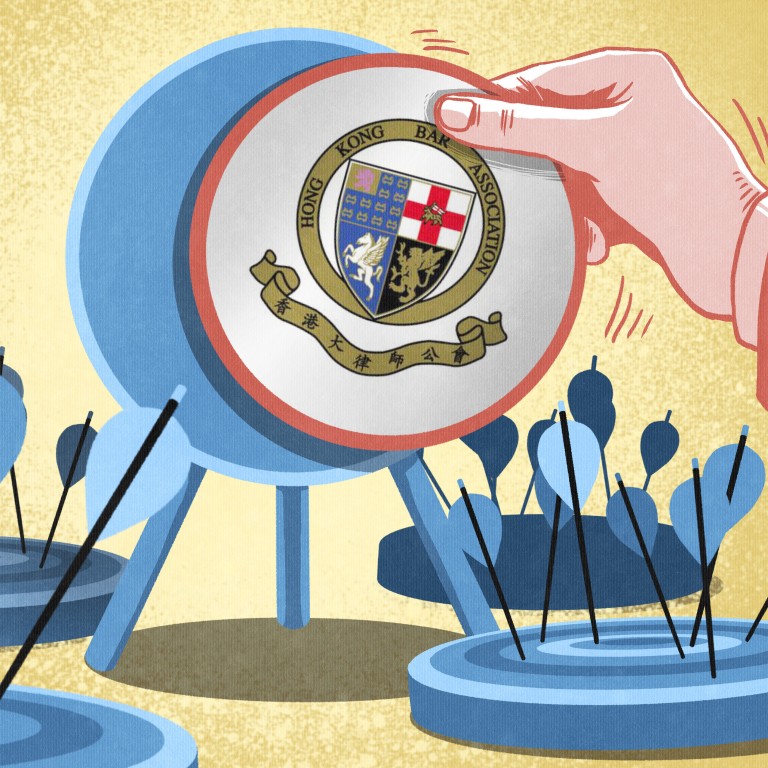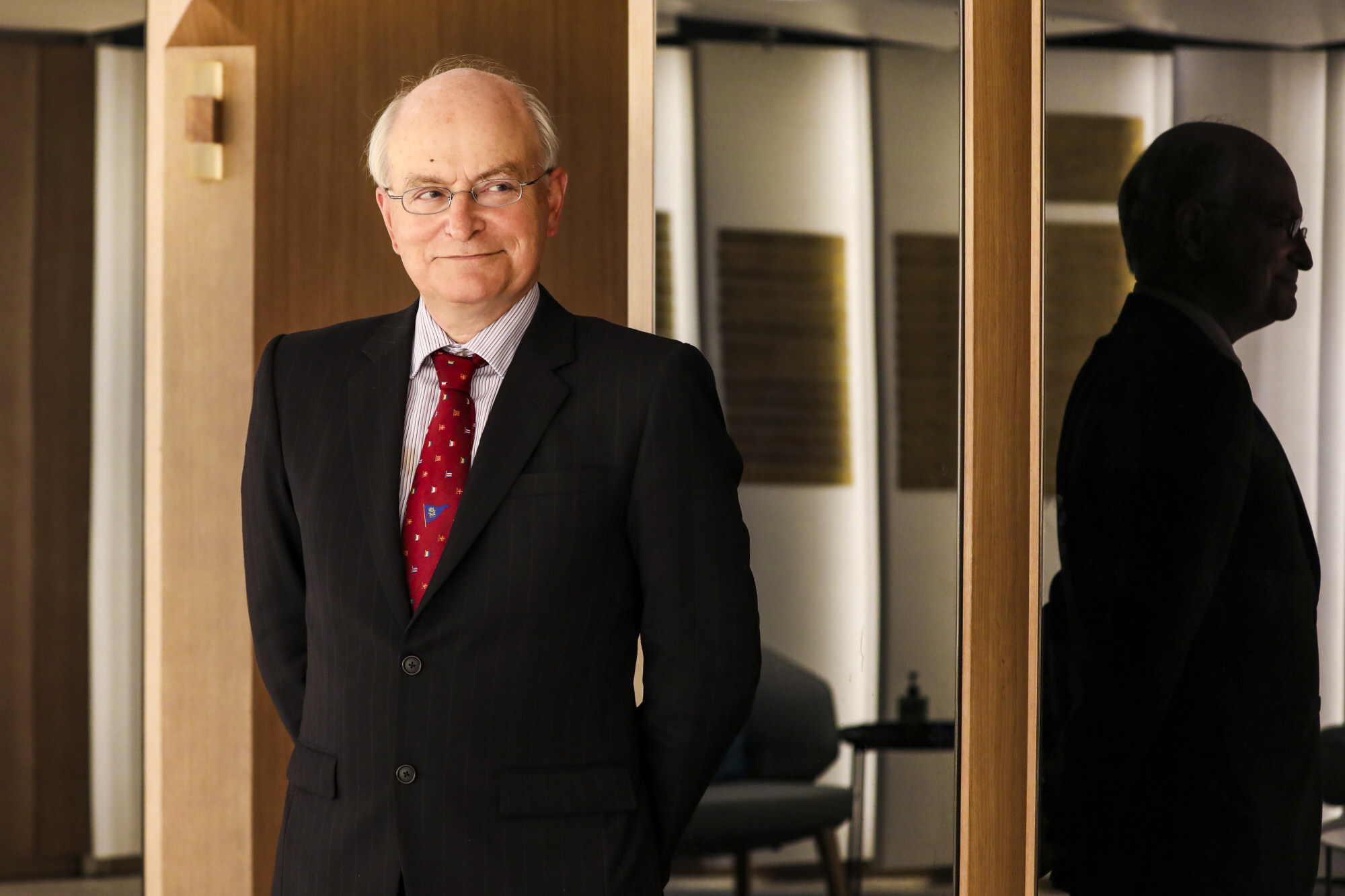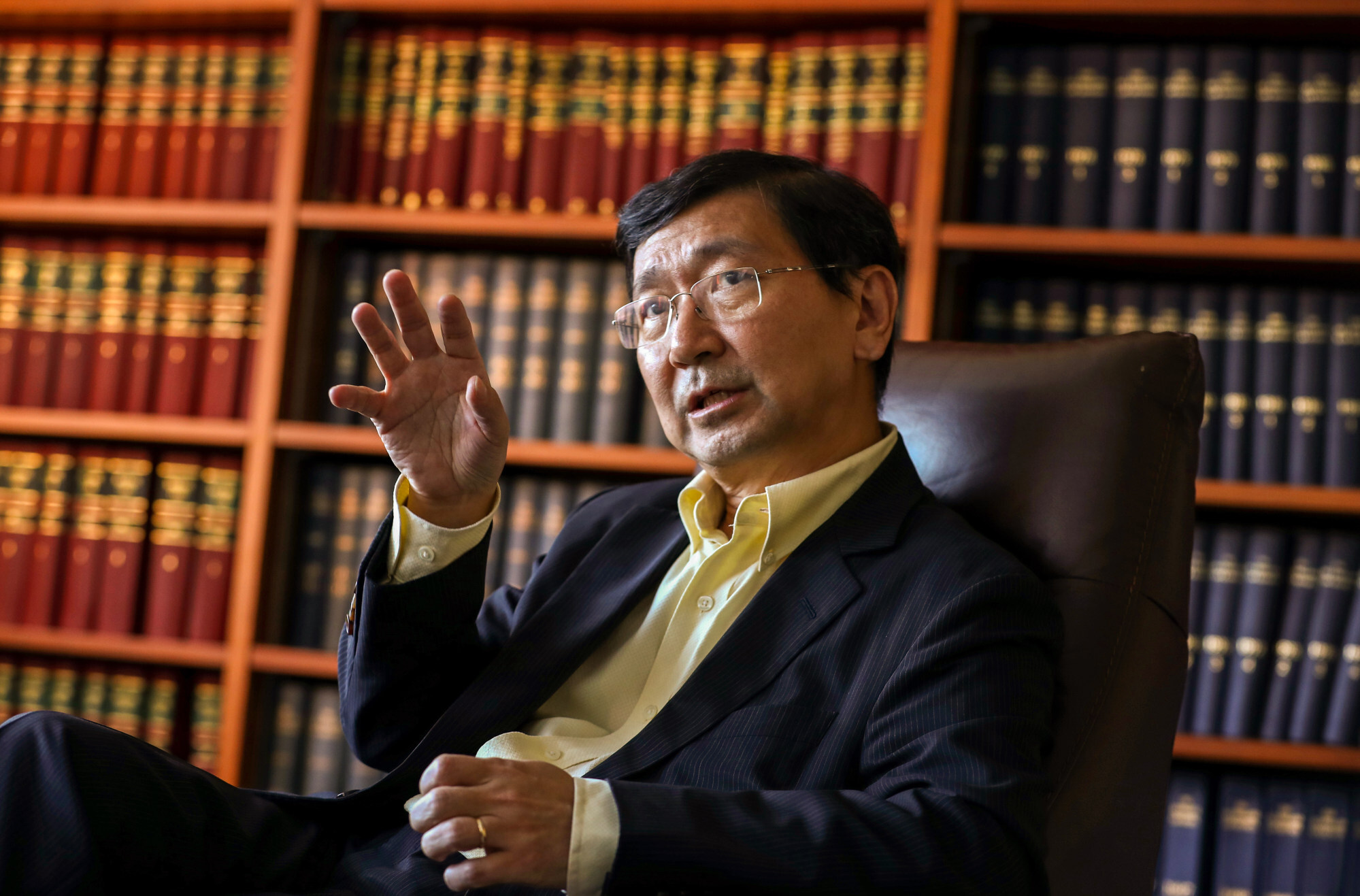
Does Hong Kong’s Bar Association need to ditch chairman Paul Harris to reset ties with Beijing? Or is the job a poisoned chalice?
- Liaison office’s condemnation of Paul Harris seen by some in city’s professional body for barristers as ominous warning, sparking fears of ‘complete wipeout’ in possible political crackdown
- British lawyer took the helm earlier this year, but his comments on national security law have ruffled the feathers of mainland Chinese authorities
A day after Beijing’s liaison office in Hong Kong vilified Bar Association chairman Paul Harris as an “anti-China politician”, the phones of members who run the city’s professional body for barristers began buzzing almost non-stop.
Monday was “utter chaos”, a Bar Council source said. Council members, who form the association’s decision-making committee, found themselves battling fresh fears of another wave of Beijing’s wrath after the central government accused their British chairman of foreign links over his membership with the Liberal Democrats party and his former role as a member of the Oxford city council.
The association’s leaders were also left wringing their hands as they tried to decode what the mainland agency meant when it declared on Sunday that the group should no longer “walk farther and farther down the road of politicisation”, or risked facing “an abyss it cannot get out of”.

The liaison office’s latest statement appeared aimed not only at Harris, but also warned of consequences for the 72-year-old legal body in Hong Kong if it failed to cut ties with its chairman, who took over the helm only in late January.
“Some senior counsels are asking if there is going to be a complete wipeout, a total annihilation,” one member, who sits on the body’s 24-seat council and has seen the messages exchanged among peers, told the Post.
The source feared the group was next in line to be firmly reined in using the “patriots administering Hong Kong” policy currently being touted by the government. Beijing had said pointedly that the association was not only a professional body but also one with statutory powers, meaning it was part of the establishment.
“The whole thing feels like ultimately we will be asked to pledge our allegiance, or face disqualification one by one,” the source said, drawing a comparison with demands of patriotism on the city’s lawmakers, civil servants and judges in recent months.
Beijing’s top office in Hong Kong ratchets up attack on Bar Association chief Paul Harris
The latest episode marks possibly the lowest point in the often uneasy relationship between Beijing and the 1,500-strong Bar Association, which has drawn the growing ire of the central government and local authorities in recent years for speaking up on issues deemed politically sensitive.
A reset of the relationship with the central government would be needed, some senior barristers from the association said, but it was unclear at what cost to the independence of the body and support from barristers.
The more immediate question was whether to succumb to pressure and part ways with Harris. Even if Harris stepped down, sources said, there might be few takers for the job, now seen as a poisoned chalice.
In the wrong place at the wrong time?
A veteran barrister specialising in human rights law, Harris moved to Hong Kong and set up his local practice in 1993. Two years later, he founded Human Rights Monitor, a human rights NGO at a time fraught with uncertainty over how life in the city would change as the 1997 handover loomed.
Harris enjoyed a friendly relationship with Beijing initially, having been part of Bar Association delegations to the mainland on four occasions, well before ties soured.

Several of his colleagues said they even found him more moderate than his immediate predecessor, Philip Dykes, also a human rights lawyer. They said Harris was thrown into the job at a time when relations with the central government were already tense.
Most of the council still backed Harris, sources told the Post. But another member, who spoke on condition of anonymity, said he started getting scattered messages from colleagues asking whether it was best for the chairman to step down, even as they acknowledged he was being unfairly targeted.
“I’m very sad about it as he is a very honourable man, purely public-spirited, and a lawyer dedicated to the rule of law,” the member said, also citing Harris’ love for China.
Soon after the Oxford-educated Harris assumed the top post earlier this year, his weighing in on the national security law imposed last June by Beijing immediately ruffled feathers. Officials were infuriated when Harris said he wanted to explore the possibility of “getting the Hong Kong government to agree to some modifications” to the law.
The remark was seen by Beijing as a challenge to the authority of the National People’s Congress Standing Committee, the country’s top legislative body, and a show of “resistance to Hong Kong’s rule of law and constitutional order”, according to the liaison office’s Sunday statement.
Beijing’s liaison office says it has right to handle Hong Kong affairs
The words used by the association chairman to describe the August 18 and 31 protests that year were to “conceal and whitewash their illegal nature, openly excuse the offenders, unreasonably accuse the court” and attacked the Hong Kong government and police for trying to impose law and order, according to the liaison office.

The source also took issue with his membership with the Liberal Democrats in Britain and his former role as a councillor there, from which he resigned just before he became Bar Association chairman. Harris had faced intense pressure from the pro-establishment camp, including former Hong Kong leader Leung Chun-ying, to relinquish his ties earlier this year.
His founding role with Human Rights Monitor, with funding from the National Endowment for Democracy, an entity backed by the United States government, was also problematic, according to the source.
Speaking to the Post on Sunday, soon after the liaison office statement was issued, Harris stoutly denied being “an anti-China politician”, and said he had supported the principle of “one country, two systems”, Beijing’s governing policy on Hong Kong under the city’s mini-constitution, the Basic Law, which he said he also endorsed. He opposed violence, he said.
“I have never been a professional politician. I served as an unpaid volunteer local councillor when I lived in Oxford and was at that time a member of the Liberal Democrats party from which I have since resigned. Since I stopped being a councillor, I have not been involved in politics either in the United Kingdom or in Hong Kong,” he added.
Harris also offered to meet liaison office officials to clarify matters. But the source from the office shrugged off the need for this. “What is the point of meeting him? He had made his stance very clear via his past comments and published articles,” he said.
Is Harris’ exit the answer?
“I think the key message is pretty clear: Paul Harris needs to step down or he might drag the Bar Association down with him,” the source said.
He argued the nature of the legal body went beyond one that only had professional functions. It had a number of powerful statutory duties, he noted. While it has its own rules and regulations for more specific matters, many of the Bar Association’s roles are governed by the Legal Practitioners Ordinance, including the registration of its members and the handling of complaints against barristers at the initial stage.
“Its chairman should follow the principle of ‘patriots governing Hong Kong’,” the source said.

Legal scholar Johannes Chan Man-mun, from the University of Hong Kong, disagreed.
“The Bar Association is a professional body and not a statutory body. In any event, I am not aware of a principle that any person assuming statutory duties would have to be a patriot,” said Chan, who is also an ex-member of the association’s governing council.
The academic said companies in Hong Kong also assumed certain statutory duties under the Companies Ordinance. If what the liaison office source suggested was true, then by the same token workers from every company would have to declare themselves as patriots, Chan argued.
Chan also said foreign nationals should not be barred from leading the Bar Association simply because of the close ties they were bound to have with their native country, noting such a condition was not imposed.
“The Basic Law even allows a foreigner to serve as a member of the Legislative Council, showing that a foreigner with a close tie with a foreign country is perfectly compatible with maintaining the rule of law and the Basic Law, or supporting one country, two systems,” he said.
But the Bar Council member who spoke on condition of anonymity said Beijing seemed intent on getting rid of Harris, and many in the group were struggling with what to do next in the wake of the liaison office remarks.
The member added that peers had also taken note of other pro-Beijing remarks, such as those by Andrew Fung Wai-kwong, a former coordinator in the Chief Executive’s Office in an opinion piece published on Monday.
Writing on pro-Beijing portal DotDotNews, Fung called the liaison office statement the “last warning shot”, an observation shared by other Beijing loyalists.
Pro-establishment figures along with pro-Beijing newspapers over the past months had been campaigning for Harris to step down.
Following the latest liaison office attack on Sunday, leftist unionist Stanley Ng Chau-pei, of the Federation of Trade Unions, argued that neither the Bar Association nor Harris should be exempted from the principle of “patriots ruling Hong Kong”.
The Bar Council source said whoever replaced Harris could also be vocal and the problems with Beijing would arise again.
“So they probably want us to be patriotic or else to be shown the door,” the source said.
Wading into the controversy on Tuesday ahead of her Executive Council meeting, Chief Executive Carrie Lam Cheng Yuet-ngor said her administration currently saw no role it should take in the affairs of the Bar Association. But she warned: “If there are instances or complaints about the association not acting in accordance with Hong Kong laws, then of course the government will be called into action.”
A spokesman from the Department of Justice said the Bar Association was a “professional body” charged with the responsibility to regulate barristers.
Asked if the department would take any possible action against the body or participate in its reform, the spokesman said it would not divulge details of internal communications, but added the body’s chairman was elected by its members in accordance with rules and regulations.

An uneasy relationship with Beijing
Under Beijing’s recent overhaul of the city’s electoral system, it also became clear the influence of the legal sector in selecting the chief executive was being curtailed. In the past, some Bar Association members had won a number of seats in the legal subsector of the Election Committee, the body that votes for the city’s leader.
But under the new electoral framework, half of the 30 seats for the legal sector will now be filled by groups hand-picked by Beijing, and the remaining votes will be from corporate members instead of individuals. The 1,500-strong Bar Association will only get one vote to decide who will represent them on the Election Committee.
Compared to its counterpart the Law Society – a lawyers’ group which is traditionally seen as more moderate – the Bar Association has for years maintained a complicated relationship with Beijing. In 2003, the association, under the helm of then chairman Alan Leong Kah-kit, spearheaded a campaign against proposed national security legislation.
The bill, drafted to fulfil the constitutional duty stipulated in Article 23 of the Basic Law, was eventually shelved after half a million people took to the streets in protest. Leong, and a number of leading barristers such as Audrey Eu Yuet-mee, Ronny Tong Ka-wah and Margaret Ng Ngoi-yee, subsequently formed the Civic Party in 2006, which became the city’s second-biggest opposition party.
There were times when ties between Beijing and the Bar Association were less strained, notably in the years when senior counsel Winnie Tam Wan-chi and Paul Lam Ting-kwok – both considered to be moderate figures – were at the helm from 2015 to 2018.
But relations soured again in 2018 after Senior Counsel Philip Dykes beat Lam, who was seeking a second term, in a highly charged election. Most of the leadership polls in the association had been largely uncontested in recent years.
Many senior lawyers approached by the Post declined to comment on the latest tensions, citing sensitivities. Some, including Dykes, said they would rather not comment for fear of “fanning the flames”.
But another senior member of the Bar Association suggested the 2018 episode might have contributed to the body’s current predicament.
He said the coup-like attempt to score seats by a group of members with a more obvious political leaning made it easier for the public to form a biased impression of the association.
‘We are not a political organisation,’ Hong Kong Bar Association says
While he agreed it was appropriate for the team under Dykes to speak out on issues when they did, “the manner in which they did it, their tone and frequency” gave the impression they were speaking only for one side of the political spectrum, namely the opposition.
He added that Harris’ fatal flaw was not that he inherited the job itself, but the deeply-held perception of a Bar Association spoiling for confrontation with the government.
Former Bar Association chairwoman Winnie Tam shared a similar sentiment in her recent column in Chinese-language newspaper Ming Pao. She argued that the Bar Council under Dykes had failed to embrace those who appeared to be more politically neutral.
“Now that Harris is in charge, even though he has the intention to set things right, it is not easy,” she said. “The entire legal profession is facing a huge crisis. It is important to reform during these critical times, but establishing a rational and neutral image should be the first priority.”
But the anonymous Bar Council member said Dykes and his team took control at a time when the city was grappling with a number of controversial issues, including the disqualification of lawmakers and the decision to have a small part of the West Kowloon high-speed rail network placed under mainland jurisdiction.
Campaigning on the slogan “A strong bar, a strong rule of law”, Dykes’ upset victory in the association in 2018 signalled a more muscular approach to dealing with both the local and central governments at a delicate time. From the get-go, the association under Dykes began issuing statements on a range of issues.
Mainland officials overseeing city affairs, who used to receive an annual delegation from the Bar Association, signalled their displeasure. They did not extend an invitation that year.
Beijing also reportedly pressured Peking University to ban two local human rights barristers from teaching a law course there just months after Dykes took over the post.
But from 2019, the association began repeatedly locking horns with Beijing and Hong Kong authorities, starting from when the government unveiled the ill-fated extradition bill that would have allowed the transfer of fugitives to the mainland.
“The fugitives bill is a step backwards from the perspective of international cooperation in criminal justice,” the body wrote in a statement in April 2019.
The legislation was eventually scrapped, but not before it sparked months of often violent protests. In the aftermath, Beijing’s imposition of the national security law in June last year further fuelled tensions between the professional body and the central government.
Pressure builds on Association to remove new chairman over ties to British political party
By the time Dykes wrapped up his three-year stint in January 2021, the association had issued more than 40 statements under his leadership. Some of them were rebuttals of local and mainland authorities’ views on certain constitutional issues. But many others decried the recent attacks on judges from both sides of the political spectrum, as the courts worked through a series of trials related to the 2019 protests.
Veteran criminal barrister Cheng Huan said the primary responsibility of the Bar Association should be the protection of the interests and livelihoods of its members, the vast majority of whom were not interested in politics.
“Recent criticisms of its chairman have jeopardised the desired good relationship between Beijing and the association,” the senior counsel argued.
Like Dykes, Harris too had said he wanted to re-establish communication with Beijing.
The question now remained whether such a reset could take place under Harris or a new president.
Executive councillor Ronny Tong, who was Bar Association chairman from 1999 to 2001 and quit the Civic Party in 2015, said it all hinged on whether Harris would step down.
Tong said Harris’ departure could help mend the rift with Beijing. He added that the association should be allowed to comment on legal issues in the city, but only by replacing Harris with someone more “politically neutral” will Beijing start listening to the body’s advice again.
But Tong, also a senior counsel, argued that he did not see the need for those on the Bar Council to take an oath or pledge allegiance, as the association had no political power.
Legal scholar Chan said no matter who ended up helming the association, it was important to allow it to continue to speak up on legal issues, as long as it was based on reason.
“It would be a sad day for Hong Kong if one cannot comment on a court case merely because it involves someone whom the authorities do not like,” he said.
Additional reporting by Ng Kang-chung, William Zheng and Lilian Cheng


